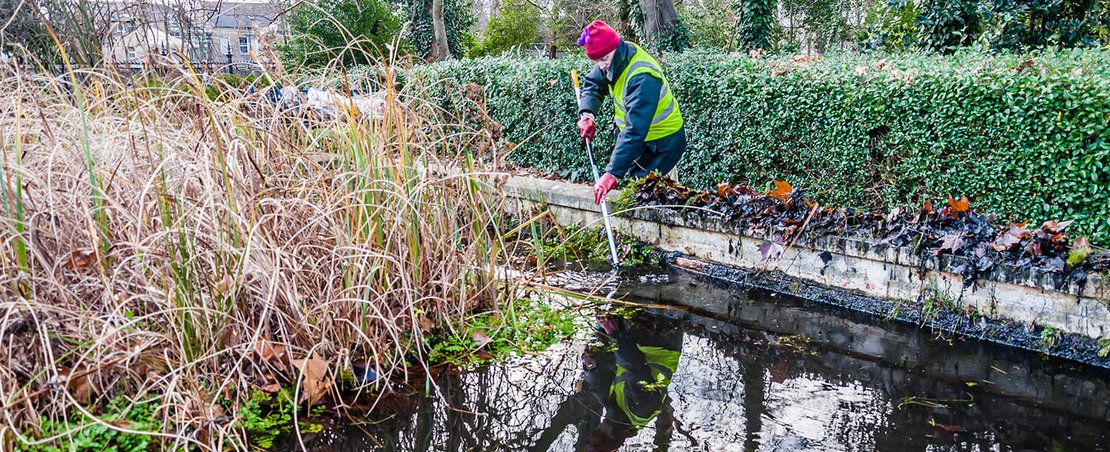
We convened senior stakeholders from volunteer-involving organisations and industry bodies, data and technology leaders, academia, and, importantly, volunteers to explore how a modern, open, data infrastructure could be used to improve the volunteer experience.
Volunteering plays a crucial role in society, delivering essential services for communities, contributing to the economy, and developing skills for people. However, the current volunteering system is fragmented, with data silos limiting access to opportunities and hindering collaboration. In partnership with the Department for Culture, Media and Sport (DCMS), we explored how a modern, open data infrastructure could enhance the volunteer experience. By improving data interoperability, using AI, and increasing digital literacy, organisations can streamline volunteer recruitment, personalise experiences, and foster greater engagement.
To unlock these benefits, three priority areas must be addressed: embracing innovation, enabling data sharing, and building a data culture. If you are interested in building new collaborations to do more research, or want to develop proofs of concept that prove the value of volunteer data infrastructure, we want to hear from you. Read the article and find out more.
Introduction
Volunteers play a critical role in society, delivering essential services to our communities, providing support in emergencies, educating young people, fundraising for charities, providing support to vulnerable people, offering spiritual opportunities and much more. Through these experiences, volunteers develop their own skills, improve their wellbeing, and were estimated to contribute £26 billion a year to the economy.
The volunteering system is diverse and complex. It encompasses volunteers, the organisations they support, and the organisations who work to make volunteering work. There are many ways to volunteer, for example taking a formal role with an established charity, or more informal volunteering such as self-organising and taking social action. There are a wide range of volunteer-involving organisations including large multi-national charities, movements like Scouts or parkrun, medical charities, associations and sports clubs, ‘pop-up’ volunteer groups with shared interests and many more. The system also includes a range of national and international organisations and campaigns that work to improve and increase volunteering.
Despite this diversity, the volunteering system has a common aim - to drive an increase in volunteer hours and the social, environmental and economic impact of these hours by: empowering volunteers, building a diversity of volunteers and volunteering opportunities, improving the volunteer experience, and enabling collaboration and innovation.
We’ve been working with The Department for Culture, Media and Sport (DCMS) to explore the hypothesis that a modern, open, data infrastructure could be used to improve the volunteer experience, making it easier for volunteers to find opportunities, supporting the growth of volunteering and increasing its impact.
The state of volunteering data infrastructure
Digital services provide new methods to attract, recruit and manage volunteers. Modern analytical methods provide new ways to understand volunteers and volunteering. Technology innovation, including advancements in AI, presents huge opportunities for the volunteering system.
It’s essential that we continue to explore the barriers to adopting AI and support small charities with the tools and skills they need to implement AI effectively and safely. AI has the potential to transform organisations, particularly those facing significant resource pressures and rising demand for services.
To take advantage of digital and AI innovations, organisations require access to a modern, open, data infrastructure that includes: datasets; the technology, training and processes that make them useable; policies and regulations such as those for data sharing and protection; and the organisations and people that collect, maintain and use data. Previous DCMS research identified that the digital volunteering marketplace is fragmented, with limited data interoperability between tools. There are also concerns around levels of data skill and concerns around inclusion.
Fragmented and siloed data
There is a lot of volunteering data. However, data is currently fragmented and siloed, inconsistent and of variable quality, and data capabilities are limited. Whilst these challenges are not unique to the volunteering system, the volunteering system tends to have a lower capacity to invest in transformation and innovation.
Volunteer-involving organisations use a wide range of volunteer management and other digital systems, which are usually built to proprietary requirements and specifications. Whilst systems deliver the capabilities these organisations need, data is often siloed within them.
These data silos make it difficult for both volunteers looking to find opportunities and for volunteer-involving organisations looking to market the opportunities they have. The disconnected nature of these systems also leads to challenges in connecting local volunteering infrastructure with national infrastructure, and in developing partnerships across the volunteering system.
Some organisations are promoting open data-based solutions to these challenges.
Research from Team Kinetic into the response to the COVID-19 pandemic emphasises the importance of improving interoperability between systems.
“Interoperability will depend on a well-structured and well-documented, publicly available API; this is required for all the involved Volunteer Management Systems so they can talk to each other. Creating and maintaining a good quality API is a non-trivial technical task.”
More recently, in October 2024, George Grima, Co-founder and CEO at Doit published an article outlining the need to ‘build the digital rails for civil society’. In the article, he references work that Doit is undertaking to develop ‘Open Volunteering’.
‘We’re working towards developing open data standards that will make it easy for a charity to publish once to any volunteering platform, management system or advertising board and have their advertisement populated across the UK’s many tools. This will let charities, campaigns and communities have their own dedicated and custom platforms whilst still getting their opportunities in front of the public.’
Data skills
Digital skills in the charity sector are maturing. The Charity Digital Skills Report 2024 states that ‘90% of charities rate themselves as fair to excellent at basic digital skills.’ The same report highlights that ‘Growing staff/volunteer digital skills is a priority for 46% of charities.’.
However, data skills and maturity continue to be an area of concern for volunteer-led organisations. There is a clear gap between larger and smaller charities, and there are also variations between sectors. Data Orchard’s latest report on data maturity in the nonprofit sector emphasises that “Skills remains the worst scoring theme for all sectors and hasn’t shifted in the last four years. Most organisations don’t have the right skills, capabilities and resources to maximise the use of their data, and many do not know what they need. Data literacy is a challenge for over 75% of organisations.”
Digital inclusion
Linked to digital and data skills, there is a concern that a shift to digital tools may exclude volunteers from some demographic groups. There is a risk of barriers being created as digital tools become more commonplace. Digital poverty risks exacerbating existing inequalities for people living in rural areas, older people, people from lower socioeconomic groups and disabled people.
Although the world is increasingly moving online, we know not all our volunteers (and colleagues that work with, and support, volunteers) are confident to use digital tools. We also know there are barriers around access to devices, connection to the internet, and with an unfolding Cost of Living Crisis, the ability to afford these tools.
Developing the data infrastructure
There is a clear appetite to make better use of data infrastructure and digital services to transform volunteering; with the potential to unlock new methods of volunteering and new communities of volunteers. Through our research and convening we have identified three priority areas of focus that will enable the volunteering system to develop a modern, open, data infrastructure as a foundation for digital transformation, innovation and AI.
1. Innovate to increase impact
Investing in a modern, open data infrastructure for volunteering would be a catalyst for innovation. The impact of the volunteering system can be significantly enhanced through the strategic use of data and technology.
Across the volunteering system, there is a strong level of interest and inquisitiveness in the potential of AI, and excitement about the opportunities it presents for improving the matching of volunteers to opportunities, personalising experiences, supporting volunteer-involving organisations with marketing and outreach, and reducing the administrative burdens volunteers face, enabling them to focus on impactful activities.
Analysing data, at scale, can help identify gaps in service, understand regional differences, and measure the impact of volunteering on individuals and communities. Providing valuable insights that can enable organisations to refine and develop their offers.
Making data about opportunities to volunteer openly available would enable organisations from across the volunteering system to more effectively market their opportunities and explore new avenues for volunteer recruitment, such as social prescribing, partnerships with job centres, and incorporating volunteering into school curriculums.
Additionally, recognising and rewarding volunteering contributions, through incentives, could encourage greater participation.
By embracing innovation and data-driven decision-making, the volunteering system can become more efficient, effective, and responsive to community needs. Innovative digital solutions, powered by open data, could also be used to empower citizens to get involved locally, on their own terms.
Innovation, particularly at scale or using novel technologies must be ethical. The volunteering system must consider data and AI ethics as part of its data culture, alongside technical skills.
2. Enable data sharing
Enabling data sharing is crucial to allow these innovations and improve the volunteering ecosystem. Currently, data is siloed across numerous platforms and organisations, creating friction for volunteers who must navigate multiple systems and repeat information. This fragmentation also hinders understanding of the volunteer journey and can lead to volunteers dropping out of the onboarding process.
The existence of multiple volunteering platforms isn't necessarily a problem, the platforms provide a wide range of functionality and address different audiences in meaningful ways, for example fuelling face-to-face support into volunteering through volunteer centres. However, there is a need to make it easier for these platforms to showcase the full scope of available volunteering opportunities.
In the physical activity sector, the Sport England-funded OpenActive initiative has provided a sector-wide solution to sharing data about opportunities to participate in physical activity. OpenActive now contains over 3.2 million live opportunities from over 4,000 providers. This data is used in local and national services such as MCR Active and Every Body Moves to make it easier for people to get active.
Investing in a similar solution for volunteering would make it easier for people to find opportunities to volunteer and enable better analysis of trends, regional differences, and the impact of volunteering initiatives by government, volunteer centres, local authorities and volunteer-involving organisations.
Innovative personal data infrastructures, built using modern digital wallet protocols such as Solid, could empower individuals to control access to their personal data, for example about their skills, qualifications and experiences, and enable volunteers to share this with volunteer-involving organisations. This could facilitate smoother interactions, for example, increasing the speed of onboarding, and enabling innovations such as task-based volunteering. Further research is required to develop a compelling case and operating model for the use of these wallet technologies and to understand and mitigate perceived risks.
Where volunteer-involving organisations have invested in data infrastructure they are reaping rewards. One national charity had increased safety training compliance from under 70% compliant to 99% using data about training uptake to target interventions and groups and individuals. The organisation has invested in modernising its data platform to enable training to be logged and monitored automatically, reducing volunteer and staff burdens whilst maintaining compliance.
3. Build a data culture
Enabling data sharing as a foundation for digital transformation, innovation and AI will require investment in developing a data culture that is curious, collaborative and cooperative. Building this data culture within the volunteering system is as important as, if not more than, building new technical infrastructure.
The volunteering system is at disparate levels of data maturity, with many organisations lacking the skills and confidence to effectively use data, often viewing it narrowly as personal information that must be controlled, rather than a tool for strategic decision-making and improving user experiences. This includes a gap in understanding what data they possess and how to analyse it.
These gaps in knowledge lead to lower levels of trust within and between organisations and a reluctance or nervousness to share data that could be used to empower volunteer-involving organisations and volunteers.
Building a data culture is critical to fostering an environment of trust, transparency and collaboration among organisations and volunteers. For example, the collaborative process of developing open standards for data could democratise data and increase transparency, but successful implementation would require a foundation of cultural change and meaningful community engagement.
Organisations across the volunteering system need to move beyond seeing data as an abstract concept and cost and connect it to tangible improvements in volunteering experiences and community impact. Government support is available to aid this process, but it should be in the form of assistance rather than regulation, and priorities should be agreed collaboratively.
Next steps
Investing in building a data culture, enabling data sharing, and fostering innovation could transform volunteering. It could provide a modern, open data infrastructure that enables data to be findable, accessible, interoperable and reusable.
The importance of this topic cannot be overstated. Volunteering plays a vital role in society, contributing billions to the economy and delivering essential services to communities. By improving the volunteer experience through better data infrastructure, we can unlock new opportunities, increase volunteer engagement, and maximize the positive impact of volunteering.
The ODI is ready to support the development of a volunteering data infrastructure. This supports our mission to create a world where data works for everyone. Building on the success of OpenActive and bringing data about physical activity together with data about volunteering, and potentially community services, could be transformational for communities across the UK.
DCMS has pledged to continue to engage with volunteering system organisations across 2025 to explore the potential of data infrastructure.
The ODI would also be interested in building new collaborations to undertake further research or to develop proofs of concept that prove the potential value of volunteer data infrastructure. If you have a relevant project or proposal or would like to find out more please contact our principal data specialist Andrew Newman ([email protected]).


